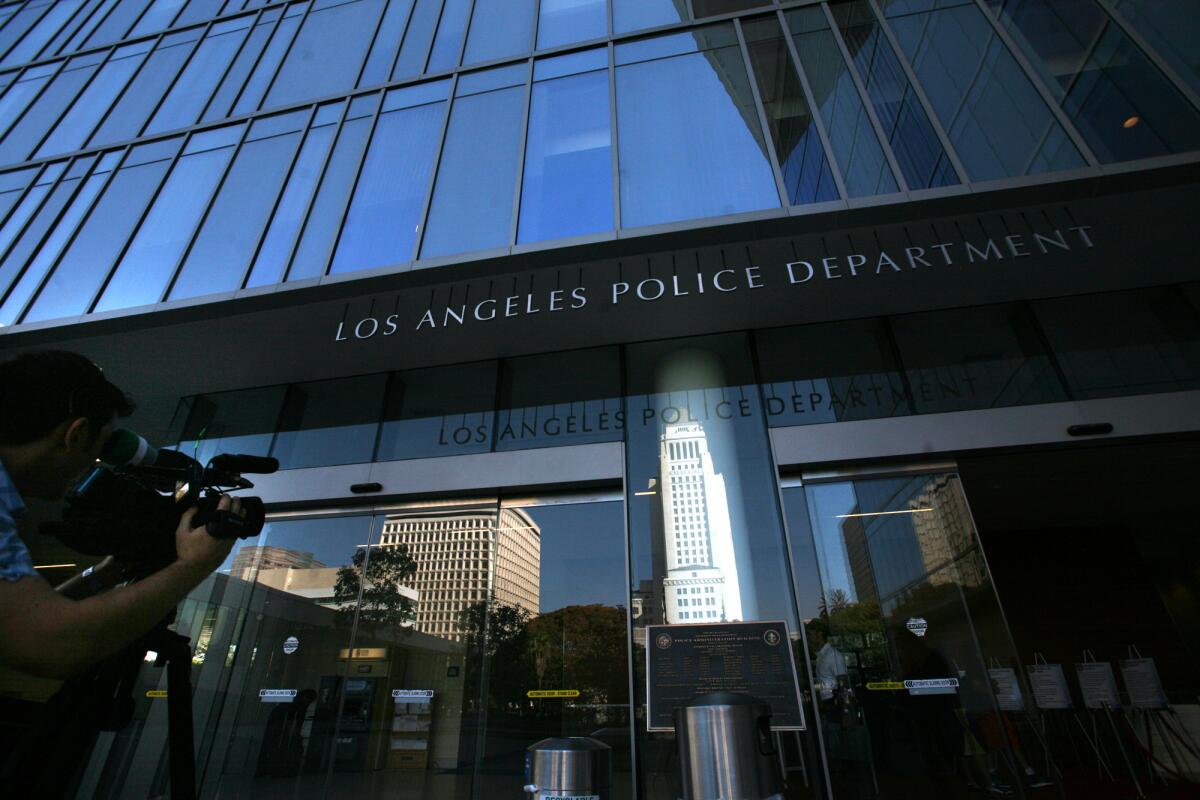Police Commission approves stricter rules for some LAPD searches

- Share via
The Los Angeles Police Commission approved a new policy Tuesday that requires LAPD officers to more carefully document instances in which people give them permission to search them on the street.
In the past, an officer could search a person, their vehicle or their belongings — regardless of whether they had reasonable suspicion that a crime had been committed or probable cause to make an arrest — if that person verbally consented to the search or gave “implied consent” through their actions or gestures.
Under the new policy, which the commission unanimously approved, officers can still conduct so-called “consent searches,” but only after securing proof of that consent — either by capturing the person giving their consent on body-worn video or by getting the person to sign off on a written consent form.
The policy also states that as a matter of best practice, officers should make clear — including verbally on their body-worn video if possible — the reason they are conducting the search, what they are searching for, where they are searching, what if anything they discover and where those items were found.
“It is understood that each incident is shaped by various factors which may preclude officers from following best practices in every situation,” the new policy states. “However, when practicable and safe to do so, officers should make every attempt to employ the procedures.”
The policy change, part of a broader and ongoing effort by the commission to deal with racial bias in LAPD street stops, does not affect an officer’s ability to search a person who is suspected of a crime or who is being arrested. It also does not prevent them from doing a “pat down” of a person when they have “articulable facts” that cause them to believe the person “is dangerous or may be carrying a weapon,” according to a letter LAPD Chief Michel Moore submitted to the commission.
Commissioners said Tuesday that the policy was intended to address criticism in the community that officers too often conduct searches of people — and particularly people of color — without their consent or any other justification. They said it was one small piece of what is intended to be broader reform around officer stops in the future.
The policy change follows a report by the LAPD’s inspector general, released last month, that reviewed hundreds of thousands of LAPD stops last year and, like a previous Times investigation, found significant racial disparities.
Among other issues, the inspector general found that units specifically assigned to suppress crime in communities of color were more likely to subject the people they stopped to extensive questioning, to handcuff them, to force them to face a wall and to check their tattoos. The result was that Black and Latino men were subjected to prolonged interrogations with far greater frequency, the report found.
The report also found that the stops were often a thinly veiled “pretext” to investigate more serious crimes, and that the strategy was a failure.
The commission Tuesday also approved new guidelines for serving search and arrest warrants, and voted to accept the inspector general’s report. Commissioners promised to continue working to identify policy changes that will help mitigate and end disparate impacts of policing on communities of color.
Police officials said they are carefully reviewing training for officers and building out more robust tracking mechanisms to improve outcomes and collect better data around such stops in each of the department’s geographic divisions.
The commission’s actions came in the face of significant pushback from community activists, who held a news conference in front of LAPD headquarters downtown Monday and called in to the commission’s Zoom meeting to denounce disparate treatment of Black and brown people by LAPD officers and demand an end to the department’s use of pretextual stops altogether.
Hamid Khan, with the Stop LAPD Spying Coalition, said at the Monday news conference that such stops reflect illegal racial profiling, subjecting people of color to stops in numbers that are wildly disproportionate to their share of the city’s population.
“We have a major problem,” he said.
Paula Minor, of Black Lives Matter Los Angeles, said the city’s own data show that the LAPD’s approach to stops is racially biased. She said pretextual stops “victimize and harm Black people in ways that LAPD and the office of the inspector general cannot justify,” and must be stopped.
A broad coalition of groups known as the PUSH L.A. Coalition — which includes Black Lives Matter, the ACLU of Southern California and other groups — called the policy changes adopted Tuesday “inadequate.”
More to Read
Sign up for Essential California
The most important California stories and recommendations in your inbox every morning.
You may occasionally receive promotional content from the Los Angeles Times.











